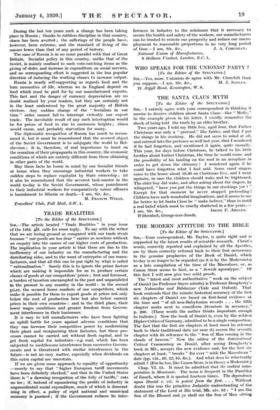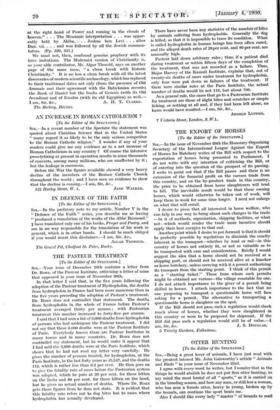THE MODERN ATTITUDE TO THE BIBLE
[To the Editor of the SPEcrxron.1 Sm,—Your correspondent, Mr. Taylor, is quite right and is sutoported by the latest results of scientific research. Christ's words, correctly reported and explained by all the Apostles, are by them correctly referred back to their first occurrence in the genuine prophecies of the Book of Daniel, which to-day is no longer to be regarded (as it is by the Modernists) as a late compilation of the time of the Maccabees, or, as Canon Store seems to hint, as a "Jewish apocalypse." Of this fact I will now give two solid proofs.
The "latest and most authoritative" work on the subject of Daniel (as Professor Sayce admits) is Professor Dougherty's new Nabonidus and Belshazzar (Yale and Oxford). That book contends that the minute historical accuracy of the first six chapters of Daniel are based on first-hand evidence at the time and "of all non-Babylonian records . . . the fifth chapter ranks next to cuneiform literature in accuracy," p. 200. (These words the author thinks important enough to italicize.) Now the book of Daniel is, even by the wildest Higher Critics of Germany, admitted to be a single composition. The fact that the first six chapters at least must be referred back to their traditional date (or near it) covers the seventh chapter with its reference to the "Son of Man coming in the clouds of heaven." Now the editor of the International Critical Commentary on Daniel, after seeing Dougherty's book in MS., accepts the new evidence and, for the first six chapters at least, " breaks " for ever "with the Maccabean " date (pp. viii., 20, 22, 85, fic.). And what does he reluctantly admit ? (For he too, like Canon Store, is in theory a Modernist.) Chap. VI. 18. It must be admitted that the earliest inter- pretation is Messianic. The term is frequent in the Parables of Enoch, where it is quoted fourteen times. The dependence upon Daniel c. oil. is patent from the first. . . . Without doubt this was the primitive Judaistic understanding of the statement of the Lord at His trial, Mk. xiv. 62: "I am. the Son of the Blessed and ye shall see the Son of Man sitting dat the right hand of• Power and aiming in the clouds of heaven." . . . The Messianic interpretation. . . was appar- ently held by Akiba, . . . Joshua ben Levi. . . after Dan. vii. . . . and was followed by all the Jewish commen- tators. (Pp. 320, 321.) We must not, then, confound genuine prophecy with its later imitations. The Modernist version of Christianity is, as your able contributor, Mr. Algar Thorold, says on another page of the same issue, "a clean break with historic Christianity." It is no less a clean break with all the latest discoveries of modern scientific archaeology, which has replaced to their traditional dates not only (from the presence of Old Aramaic and their agreement with the Babylonian records) the Book of Daniel but the books of Genesis (with its Old Accadian) and of Exodus (with its old Egyptian) as well.—











































 Previous page
Previous page